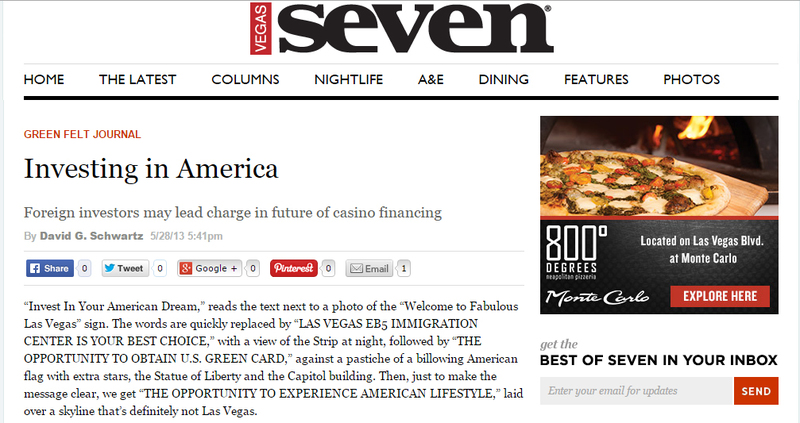Foreign investors may lead charge in future of casino financing
“Invest In Your American Dream,” reads the text next to a photo of the “Welcome to Fabulous Las Vegas” sign. The words are quickly replaced by “LAS VEGAS EB5 IMMIGRATION CENTER IS YOUR BEST CHOICE,” with a view of the Strip at night, followed by “THE OPPORTUNITY TO OBTAIN U.S. GREEN CARD,” against a pastiche of a billowing American flag with extra stars, the Statue of Liberty and the Capitol building. Then, just to make the message clear, we get “THE OPPORTUNITY TO EXPERIENCE AMERICAN LIFESTYLE,” laid over a skyline that’s definitely not Las Vegas.
Welcome to LasVegasB5llc.com, a site that helps committed overseas investors with a specific interest in Las Vegas obtain permanent-resident status in the U.S. The site is sponsored by the Las Vegas EB-5 Immigration Center, which facilitates a federal government program to encourage foreign investment. The center, a private agency, connects those who want visas with projects that fit the government’s criteria for the program. The EB-5 center is quietly playing an important role in casino development. For a Chinese national looking to invest in Las Vegas, a visit to the site’s Mandarin mirror might be the first step to a coveted green card. And for the city, it’s the first step toward a crucial influx of job-creating funds.
The Employment-Based Fifth Preference (EB-5) program is a George H.W. Bush-era legacy that opens the door for foreign nationals to get “conditional” U.S. green cards, allowing them to live in the United States for two years. To qualify, the applicant must invest $1 million in a new company that creates at least 10 full-time jobs for those besides the applicant and his family members. In targeted rural and high-unemployment urban areas, an investment of $500,000 suffices. The U.S. has 10,000 EB-5 visas available each year, but has never come close to granting that many. U.S. Citizenship and Immigration Services press secretary Christopher Bentley says the “vast majority” of applicants are from mainland China, with anecdotal evidence suggesting that as many as 70 percent of investors hail from the Middle Kingdom.
Here’s how it works: Let’s say you’re a Chinese entrepreneur who might want to move to the United States. You’re solicited by a regional center (a private group, approved by but not affiliated with the federal government) to invest in a project that has received USCIS approval. You offer to invest $500,000—or $1 million, if it’s outside of a targeted area. Immigration Services then reviews your application. If it passes muster, the agency forwards it to the State Department, which makes the final decision to issue the visa. At that point, you receive a conditional green card. If the investment continues successfully and you meet other requirements, you can apply for permanent-resident status in two years. If that’s granted, three years later you can apply to become a U.S. citizen.
Throughout most of the 1990s, USCIS approved a few hundred applications. After 9/11, there was a steep drop-off, but the numbers increased during the mid-2000s. Since the recession took root, EB-5 has kicked on the afterburners: In 2007, Immigration Services forwarded 462 petitions to State; last year, a record 3,706.
SLS Las Vegas—the heir to the departed Sahara—is the highest-profile project in town to secure EB-5 financing so far. But it’s hardly alone. Since its start in fiscal 1991, the program, according to USCIS, has created at least 49,000 American jobs and brought $6.8 billion into the country.
“You name it,” Bentley says when asked what EB-5 has funded. “Everything from Barclays Center in Brooklyn (home of basketball’s Brooklyn Nets) to a meat-processing plant in South Dakota. It’s happening across the country, especially with projects that add infrastructure like hotels.” Jay Peak Ski Resort in Vermont is another EB-5 success story.
For Las Vegas casinos, it’s an interesting financing turn. Entrepreneurs once put together syndicates of friends-of-friends (and some connected guys) to finance their dream casinos. Then corporations shifted capital access to Wall Street and institutional investors. After a mid-decade turn to private equity led to more debt load than new development, spreading the risk around to foreign investors might be the next big idea in casino financing.
http://vegasseven.com/2013/05/28/investing-america/
Mentions
States
- New York
Securities Disclaimer
This website is for informational purposes only and does not constitute an offer or solicitation to sell shares or securities. Any such offer or solicitation will be made only by means of an investment's confidential Offering Memorandum and in accordance with the terms of all applicable securities and other laws. This website does not constitute or form part of, and should not be construed as, any offer for sale or subscription of, or any invitation to offer to buy or subscribe for, any securities, nor should it or any part of it form the basis of, or be relied on in any connection with, any contract or commitment whatsoever. EB5Projects.com LLC and its affiliates expressly disclaim any and all responsibility for any direct or consequential loss or damage of any kind whatsoever arising directly or indirectly from: (i) reliance on any information contained in the website, (ii) any error, omission or inaccuracy in any such information or (iii) any action resulting therefrom.




